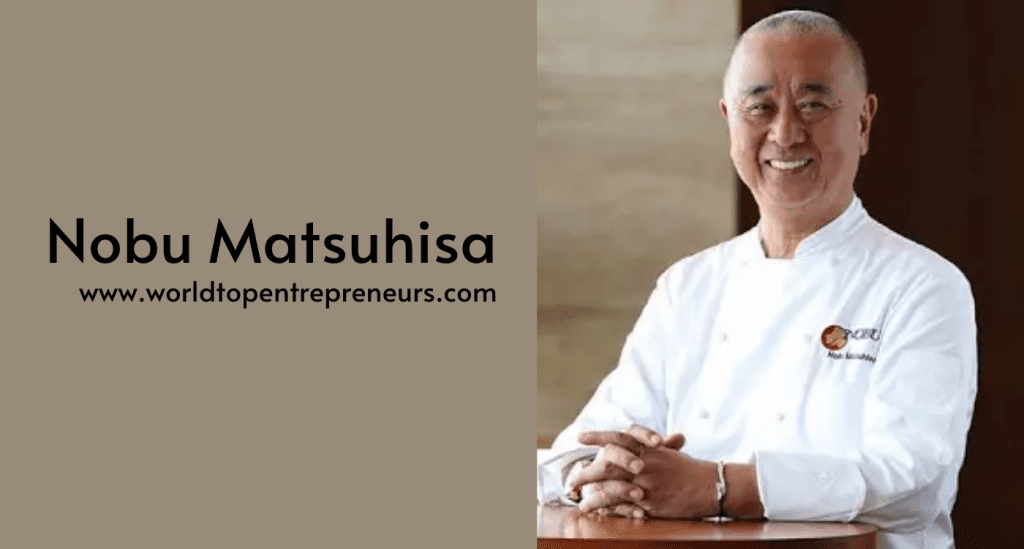In the world of fine dining, few names evoke the same level of admiration and reverence as Nobu Matsuhisa. As the founder of Nobu Restaurants, Matsuhisa has redefined the landscape of contemporary cuisine with his unique blend of Japanese flavors and Peruvian ingredients. His journey from a small sushi bar in Tokyo to establishing a global restaurant empire is a story of passion, innovation, and unyielding dedication to the art of cooking. This article explores Nobu Matsuhisa’s early life, the evolution of Nobu Restaurants, and the enduring impact of his culinary vision.
Early Life and Career Beginnings
Nobu Matsuhisa was born in 1949 in Saitama, Japan. Growing up in post-war Japan, Matsuhisa’s early years were marked by economic hardship and societal change. Despite these challenges, he was drawn to the culinary arts from a young age. His father owned a small neighborhood restaurant, which provided Matsuhisa with his first taste of the culinary world. This early exposure sparked a deep passion for cooking and set the stage for his future endeavors.
After completing high school, Matsuhisa embarked on a career in the restaurant industry. He trained under several esteemed chefs in Tokyo, honing his skills in traditional Japanese cuisine. These formative years were characterized by rigorous training and a deep immersion in the principles of Japanese cooking. Matsuhisa’s dedication and talent quickly became apparent, and he gained a reputation as a promising young chef.
The Birth of Nobu Restaurants
In the early 1970s, Matsuhisa made a pivotal decision that would change the course of his career. He moved to Peru, seeking new opportunities and inspiration. The move was driven by a desire to explore the culinary potential of combining Japanese techniques with South American ingredients. This decision marked the beginning of what would become a groundbreaking fusion cuisine.
In Lima, Matsuhisa opened his first restaurant, “Nobu.” The concept was revolutionary: it combined traditional Japanese dishes with Peruvian flavors, creating a unique culinary experience that captivated diners. Matsuhisa’s innovative approach quickly garnered attention, and the restaurant became a sensation in Lima’s dining scene. The success of Nobu in Peru laid the foundation for Matsuhisa’s future endeavors and established his reputation as a visionary chef.
Vision and Philosophy
Nobu Matsuhisa’s vision for Nobu Restaurants was shaped by several key principles that guided the development of his culinary empire:
- Fusion of Flavors: At the heart of Matsuhisa’s philosophy is the concept of fusion cuisine. He believed in blending Japanese culinary traditions with ingredients and techniques from other cultures. This approach resulted in a unique and innovative dining experience that set Nobu apart from traditional Japanese restaurants. Dishes like Yellowtail Jalapeño and Miso Black Cod exemplify Matsuhisa’s commitment to creating harmonious flavor combinations.
- Commitment to Quality: Matsuhisa’s dedication to quality is evident in every aspect of Nobu Restaurants. From sourcing the finest ingredients to employing precise cooking techniques, he ensures that each dish meets the highest standards. This commitment to excellence has been a driving force behind the success of Nobu Restaurants and has earned the establishment a reputation for exceptional dining.
- Culinary Innovation: Innovation is a cornerstone of Matsuhisa’s approach to cooking. He constantly seeks to push the boundaries of traditional cuisine and experiment with new flavors and techniques. This spirit of innovation has led to the creation of signature dishes that have become iconic in the culinary world.
- Sustainability and Ethical Sourcing: Matsuhisa is also committed to sustainability and ethical sourcing. He recognizes the importance of preserving natural resources and supporting responsible farming and fishing practices. Nobu Restaurants actively works to ensure that ingredients are sourced sustainably and that environmental impact is minimized.
Expansion and Global Success
Following the success of his Lima restaurant, Nobu Matsuhisa’s reputation as a culinary innovator began to spread beyond Peru. In the 1990s, Matsuhisa expanded his restaurant empire to major cities around the world, including Tokyo, New York, and London. Each new location brought the distinctive Nobu dining experience to a global audience.
- New York Debut: In 1994, Matsuhisa opened a Nobu restaurant in New York City in partnership with actor Robert De Niro and restaurateur Drew Nieporent. The New York location quickly became a culinary hotspot, attracting celebrities, food critics, and discerning diners. The success of Nobu New York solidified Matsuhisa’s reputation as a global culinary force and set the stage for further expansion.
- International Growth: Building on the success of the New York location, Matsuhisa expanded Nobu Restaurants to other major cities, including Los Angeles, Paris, and Tokyo. Each new location was meticulously designed to reflect the essence of Nobu’s culinary philosophy while adapting to local tastes and preferences.
- Innovative Partnerships: Matsuhisa’s expansion efforts were supported by strategic partnerships with renowned chefs, restaurateurs, and hotel groups. These collaborations allowed Nobu Restaurants to reach new markets and introduce its unique dining experience to diverse audiences.
- Nobu Hotels and Residences: In addition to expanding the restaurant network, Matsuhisa ventured into the hospitality sector with the launch of Nobu Hotels and Residences. The hotels and residences offer guests a luxurious and immersive Nobu experience, combining exceptional dining with world-class accommodations.
Challenges and Resilience
The journey of expanding Nobu Restaurants and establishing a global brand was not without its challenges. The food and hospitality industry is highly competitive, and Matsuhisa faced numerous obstacles along the way:
- Cultural Adaptation: Introducing fusion cuisine to new markets required careful adaptation to local tastes and preferences. Matsuhisa’s ability to balance authenticity with local influences was crucial in ensuring the success of Nobu Restaurants in diverse cultural settings.
- Maintaining Quality: As the restaurant empire grew, maintaining the high standards of quality and service became a significant challenge. Matsuhisa implemented rigorous training programs and quality control measures to ensure that each Nobu location upheld the brand’s reputation.
- Economic Fluctuations: The global economic landscape is subject to fluctuations, and the hospitality industry can be particularly vulnerable to economic downturns. Matsuhisa’s strategic approach and adaptability helped navigate these challenges and sustain the growth of Nobu Restaurants.
- Sustainability Efforts: As sustainability became an increasingly important issue, Matsuhisa faced the challenge of integrating environmentally responsible practices into Nobu’s operations. The commitment to ethical sourcing and reducing environmental impact required ongoing effort and innovation.
Legacy and Impact
Nobu Matsuhisa’s impact on the culinary world extends far beyond the success of Nobu Restaurants. His contributions have influenced industry practices, inspired other chefs, and shaped the future of fine dining:
- Culinary Innovation: Matsuhisa’s fusion cuisine has redefined traditional Japanese cooking and inspired a new generation of chefs. His innovative approach to combining flavors and techniques has set a new standard in the culinary world and influenced the development of modern cuisine.
- Global Recognition: The success of Nobu Restaurants has earned Matsuhisa international recognition and acclaim. Nobu has become a symbol of culinary excellence and is celebrated for its distinctive dining experience and high-quality dishes.
- Inspiration to Chefs: Matsuhisa’s journey from a young chef in Tokyo to a global culinary icon serves as an inspiration to aspiring chefs and restaurateurs. His story demonstrates the power of passion, creativity, and perseverance in achieving success.
- Cultural Exchange: Through his fusion cuisine, Matsuhisa has facilitated cultural exchange and introduced diverse culinary traditions to a global audience. Nobu Restaurants have become a melting pot of flavors and influences, reflecting the richness of cross-cultural dining experiences.
Conclusion
Nobu Matsuhisa’s journey from a small sushi bar in Tokyo to the founder of a global restaurant empire is a remarkable story of vision, innovation, and resilience. Through Nobu Restaurants, Matsuhisa has not only achieved extraordinary success but has also made significant contributions to the culinary world.
His commitment to quality, fusion cuisine, and sustainability has set new standards and inspired countless others in the field. As Nobu Restaurants continue to thrive and evolve, Nobu Matsuhisa’s legacy as a pioneering force in the hospitality industry remains firmly established. His story serves as a testament to the transformative power of culinary creativity and dedication in shaping the future of dining.





















